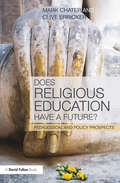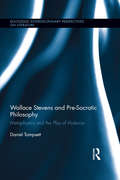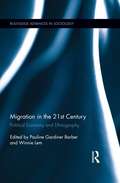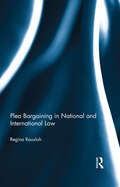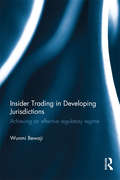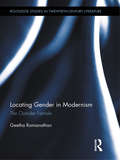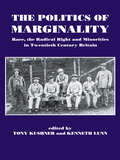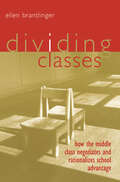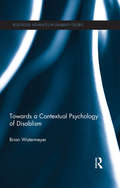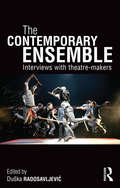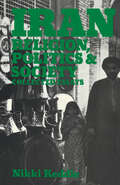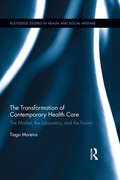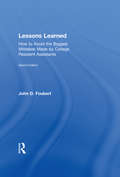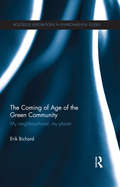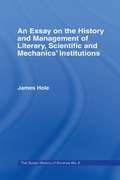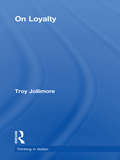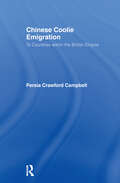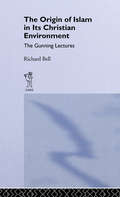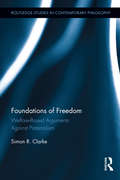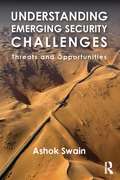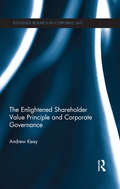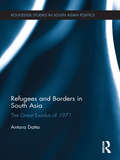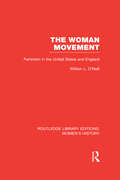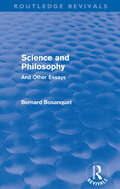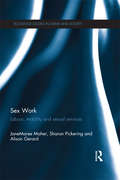Special Collections
Benetech’s Global Certified Accessible Titles
Description: Benetech’s GCA program is the first independent third-party EPUB certification to verify ebook accessibility. By creating content that is born accessible, publishers can meet the needs of all readers. Learn more: https://bornaccessible.benetech.org/
- Table View
- List View
Does Religious Education Have a Future?
by Clive Erricker and Mark ChaterThe place of religion in the modern world has changed significantly over the past two decades. This has been partially reflected in the academic study of religion, but little, if at all, in religious education. In addition, the place of RE in schools has been the subject of intense debate due to changes to the curriculum and school structure, as well as being part of wider debates on religion in the public sphere. Written by two highly experienced leading practitioners of RE, Does Religious Education have a Future? argues for a radical reform of the subject based on principles of pedagogy set free from religious concerns. It challenges teachers, researchers and educators to rethink their approaches to, and assumptions about, religious education, and enables them to see their work in a larger context that includes pedagogical ideas and political forces. The book offers readers fresh, provocative and expertly informed critical perspectives on: the global context of RE, debates about religion in public places, religion’s response to modernity, violent extremism, science and secularism; the evolving educational rationale for RE in schools; the legal arrangements for RE and their impact on the teaching of the subject; the pedagogy of teaching approaches in RE and their effect on standards and perceptions of the subject; the educational commitment of faith/belief communities, and how this influences the performance of RE. Does Religious Education have a Future? proposes a new attitude to the subject of religious education, and a new configuration of both its role and content. This book is essential reading for academics, advisers and policy makers, as well as teachers of RE at primary and secondary levels and trainee and newly qualified teachers.
Wallace Stevens and Pre-Socratic Philosophy
by Daniel TompsettThis book studies Wallace Stevens and pre-Socratic philosophy, showing how concepts that animate Stevens’ poetry parallel concepts and techniques found in the poetic works of Parmenides, Empedocles, and Xenophanes, and in the fragments of Heraclitus. Tompsett traces the transition of pre-Socratic ideas into poetry and philosophy of the post-Kantian period, assessing the impact that the mythologies associated with pre-Socratism have had on structures of metaphysical thought that are still found in poetry and philosophy today. This transition is treated as becoming increasingly important as poetic and philosophic forms have progressively taken on the existential burden of our post-theological age. Tompsett argues that Stevens’ poetry attempts to ‘play’ its audience into an ontological ground in an effort to show that his ‘reduction of metaphysics’ is not dry philosophical imposition, but is enacted by our encounter with the poems themselves. Through an analysis of the language and form of Stevens’ poems, Tompsett uncovers the mythology his poetry shares with certain pre-Socratics and with Greek tragedy. This shows how such mythic rhythms are apparent within the work of Friedrich Nietzsche, Martin Heidegger and Hans-Georg Gadamer, and how these rhythms release a poetic understanding of the violence of a ‘reduction of metaphysics.’
Migration in the 21st Century
by Winnie Lem and Pauline Gardiner BarberThis edited collection focuses on global migration in its inter-regional, international and transnational variants, and argues that contemporary migration scholarship is significantly advanced both within anthropology and beyond it when ethnography is theoretically engaged to grapple with the social consequences and asymmetries of twenty-first century capitalism’s global modalities. Drawn from settings across the globe, case studies explore the nuanced formations of class and power within particular migration flows while addressing the complex analytics of a contemporary critical political economy of migration. Subjects include global migrants as capitalists, entrepreneurs and "cosmopolitans," as well as workers and immigrants who are subject to varying degrees of precariousness under intensified competition for profits within contemporary global economies. By re-addressing the question of the relationship between changes in global capitalism and migration, the book aims for a timely intervention into the debates on migration which have come to be one of the most contentious emotionally fraught issues in North America and Europe.
Plea Bargaining in National and International Law
by Regina RauxlohPlea bargaining is one of the most important and most discussed issues in modern criminal procedure law. Based on historical and comparative legal research, the author has analysed the wide-spread use of plea bargaining in different criminal justice systems. The book sets out in-depth studies of consensual case dispositions in the UK, examining how plea bargaining has developed and spread in England and Wales. It also goes on to discusses in detail the problems that this practise poses for the rule of law by avoiding procedural safe-guards. The book draws on empirical research in its examination of the absence of informal settlements in the former GDR, offering a unique insight into criminal procedure in a socialist legal system that has been little studied. Drawing on her research findings, the author goes on to discuss the extent to which plea bargaining should be developed in the International Criminal Court in The Hague, as the question of this practise is set to be one of the seminal debates in the development of international criminal procedures in the new International Criminal Court. Plea Bargaining in National and International Law will be of particular interest to academics and students of international criminal law, criminal procedures and comparative law.
Insider Trading in Developing Jurisdictions
by Wunmi BewajiThe book examines the regulation of insider dealing in the developed jurisdictions, using three of the G7 countries as guides with the aim of knowing how they have regulated insider trading and what lessons can be learnt from their failures and achievements. It looks at regulatory regimes in the US, the UK and Japan in order to consider whether these regimes can be successfully transplanted to developing countries. In order to explore insider dealing in the developing world the book focuses on Nigeria, Africa’s most populous nation and second largest economy. This book examines in theoretical and empirical terms the law on insider trading away from the dogmatic approach of Western literature by presenting the subject from the prism of a developing jurisdiction in post-colonial Africa with a divergent cultural, historical, social, political and economic background. The author analyses what shape insider dealing takes in Nigeria, a predominantly illiterate society, and considers the groups involved. The books also explores how the concept of insider dealing regulation is understood amongst parties integral to its administration and enforcement such as lawyers, judges, stockbrokers, and ordinary investors. The legislation governing insider dealing regulation in Nigeria is critically examined to expose its strengths and weaknesses, and to see how foreign provisions and legislation have been incorporated. The book uses Nigerian experiences to consider its implications for other developing nations, arguing that regulatory regimes need to take into account the specific social, political, historical and economic factors of a particular locale rather than importing regulations wholesale from developed jurisdictions.
Locating Gender in Modernism
by Geetha RamanathanThis book visits modernism within a comparative, gendered, and third-world framework, questioning current scholarly categorisations of modernism and reframing our conception of what constitutes modernist aesthetics. It describes the construction of modernist studies and argues that despite a range of interventions which suggest that philosophical and material articulations with the third world shaped modernism, an emphasis on modernist "universals" persists. Ramanathan argues that women and third-world authors have reshaped received notions of the modern and revised orthodox ideas on the modern aesthetic. Authors such as Bessie Head, Josiane Racine, T.Obinkaram Echewa, Raja Rao, Gabriel Garcia Marquez, Sembene Ousmane, Salman Rushdie, Ana Castillo, Attia Hossain, Bapsi Sidhwa, and Sahar Khalifeh, are visited in their specific cultural contexts and use some form of realism, a mode that western modernism relegates to the nineteenth century. A comparative methodology and extensive research on intersecting topics such as post-coloniality and the articulation between gender and modernist aesthetics facilitates readings of the modern in twentieth century literature that fall outside standards of western modernism. Considering the relationship between aesthetics and ideology, Ramanathan lays out a critical apparatus to enhance our understanding of the modern, thus suggesting that form is not universal, but that the history of forms, like the history of colonialism and of women, indicates very specific modalities of the modern.
The Politics of Marginality
by Tony Kushner and Kenneth LunnImmigration to Britain has rarely achieved the levels experienced by the US, but it is nevertheless true of all periods that immigrants, refugees and soujourners have been continually present'. While we may have the beginnings of a history of immigration, ethnicity and race in Britain, there is a lack of historiographical awareness in the subject. The essays in this collection, ranging from specific case studies to broad themes, are an attempt to provide a basis for future discussion.
Dividing Classes
by Ellen BrantlingerIn this study of the school system of an Indiana town, Ellen Brantlinger studies educational expectations within segments of the middle class that have fairly high levels of attainment. Building on her findings, she examines the relationship between class structure and educational success. This book asserts the need to look beyond poor peoples' values and aspirations--and rather to consider the values of dominant groups--to explain class stratification and educational outcomes.
Towards a Contextual Psychology of Disablism
by Brian WatermeyerIn recent years, disability studies has been driven by a model of disability which focuses on the social and economic oppression of disabled people. Although an important counterbalance to a pathologising medical model, the social model risks presenting an impoverished and disembodied view of disability, one that ignores the psychological nature of oppression and its effects. This innovative work argues that a psychological framework of disability is an essential part of developing a more cohesive disability movement. Brian Watermeyer introduces a new, integrative approach, using psychoanalysis to tackle the problem of conceptualising psychological aspects of life with disablism. Psychoanalytic ideas are applied to social responses to impairment, making sense of discrimination in its many forms, as well as problems in disability politics and research. The perspective explores individual psychological experience, whilst retaining a rigorous critique of social forces of oppression. The argument shows how it is possible to theorise the psychological processes and impressions of discriminatory society without pathologising disadvantaged individuals. Drawing on sociology, social anthropology, psychology and psychoanalysis - as well as clinical material - Towards a Contextual Psychology of Disablism shapes a view of disabled subjectivity which is embodied, internal, and political. Presenting a range of conceptual ideas which describe psychological dynamics and predicaments confronting disabled people in an exclusionary and prejudiced world, this volume is an important new contribution to the literature. It will interest students and researchers of disability studies, including those working within psychology, education, health and social work.
The Contemporary Ensemble
by Duška Radosavljević‘Dr. Radosavljević has an excellent and extensive grasp of her subject, and deep understanding of not only the history of these groups, but how they function, and how each contributes to the field of ensemble theatre.’ – David Crespy, University of Missouri, USA Questions of ensemble – what it is, how it works – are both inherent to a variety of Western theatre traditions, and re-emerging and evolving in striking new ways in the twenty-first century. The Contemporary Ensemble draws together an unprecedented range of original interviews with world-renowned theatre-makers in order to directly address both the former and latter concerns. Reflecting on ‘the ensemble way of working’ within this major new resource are figures including: Michael Boyd, Hermann Wündrich, Yuri Butusov, Max Stafford-Clark, Elizabeth LeCompte, Lyn Gardner, Adriano Shaplin, Phelim McDermott; and Emma Rice; representing companies including: The RSC; The Berliner Ensemble; The Satirikon Theatre; Out of Joint; The Wooster Group; Kneehigh Theatre; Song of the Goat; The Riot Group; The Neo-Futurists; Shadow Casters; and Ontroerend Goed. All 22 interviews were conducted especially for the collection, and draw upon the author’s rich background working as scholar, educator and dramaturg with a variety of ensembles. The resulting compendium radically re-situates the ensemble in the context of globalisation, higher education and simplistic understandings of ‘text-based’ and ‘devised’ theatre practice, and traces a compelling new line through the contemporary theatre landscape.
Iran
by Nikki R. KeddieFirst Published in 1983. Routledge is an imprint of Taylor & Francis, an informa company.
The Transformation of Contemporary Health Care
by Tiago MoreiraThe past three decades have seen enormous changes in the organisation of health care. This book explores the role of knowledge production and technology on these transformations, focusing on the market (attempts to embed principles of economic rationality and efficient use of resources in the shaping and delivery of health care), the laboratory (science, experiments and 'evidence' in the management of research, practice and policy) and the forum (the application of deliberative procedures and other forms of public consultation to health care decision making).
Lessons Learned
by John D. FoubertThe college years can be some of the most vibrant and transformative in an individual’s life, but they are also fraught with uncertainty. The resident advisor or assistant (RA) not only confronts these decisions for him or herself but must also help his or her residents navigate the world of important decisions which the undergraduate experience presents. Lessons Learned is the definitive volume for training RAs to become comfortable with their roles as student leaders. Over four dozen common RA mistakes are discussed, chapter-by-chapter, in the form of individual letters written by experienced RAs to new staff members. Each chapter includes thought-provoking discussion questions, a list of internet and media resources, and additional tips related to each situation. Now in its second edition, this updated volume provides a new overview of student developmental theory and covers a host of new topics, including evolving thought on 21st century predicaments such as social media, texting and the Internet. This is an important text for beginning and experienced RAs, as well as for the university staff who train these crucial pillars of the university community.
The Coming of Age of the Green Community
by Erik BichardPeople organising to protect their environment is not a new phenomenon, but the groups that have been pushing for environmental change since the 1970s have not convinced sufficient numbers make sustainable decisions or to lead sustainable lives. Governments have serially failed to do the job at the international level. Now, climate change, resource depletion and widening social aspirations threaten to destabilise human society unless sustainable change can be influenced from another direction. The Coming of Age of the Green Community explores the activities of a new generation of community-led initiatives that may herald the beginnings of the next wave of activism. Erik Bichard combines the testimonies of dozens of group activists with historic evidence and the views of a range of commentators from a variety of disciplines to put forward reasons why some green community groups succeed while others fail. He concludes with a valuable prescription for both existing and emerging groups on how to be sustainable, both over time and in their actions. This book address one of the key questions of the twenty-first century: has the local perspective on this universal concern finally come of age?
Essay on History and Management
by James HoleFirst Published in 1970. Routledge is an imprint of Taylor & Francis, an informa company.
On Loyalty
by Troy JollimoreLoyalty is a highly charged and important issue, often evoking strong feelings and actions. What is loyalty? Is loyalty compatible with impartiality? How do we respond to conflicts of loyalties? In a global era, should we be trying to transcend loyalties to particular political communities? Drawing on a fascinating array of literary and cinematic examples - The Remains of the Day, No Country for Old Men, The English Patient, The Third Man, and more - Troy Jollimore expertly unravels the phenomenon of loyalty from a philosophical standpoint. He reflects on the idea that loyalty shapes our very identities, and considers both the benefits and the dangers of loyalty: on the one hand, how excessive loyalty can move us to perform immoral, even evil actions; one the other, how loyalty can expand our lives and give us a sense of meaning and belonging.
Chinese Coolie Emigration to Canada
by Perisa CampbellFirst Published in 1971. Routledge is an imprint of Taylor & Francis, an informa company.
The Origin of Islam in Its Christian Environment
by Richard BellFirst Published in 1968. Routledge is an imprint of Taylor & Francis, an informa company.
Foundations of Freedom
by Simon R. ClarkeWhat makes individual freedom valuable? People have always believed in freedom, have sought it, and have sometimes fought and died for it. The belief that it is something to be valued is widespread. But does this belief have a rational foundation? This book examines answers to these questions that are based on the welfare of the person whose freedom is at stake. There are various conceptions of a worthwhile life, a life that is valuable for the person whose life it is. These conceptions will be examined to see whether they are plausible and what their connection, if any, is to freedom. Are they compelling foundations for freedom? Does freedom make a person’s life better or would his/her welfare be advanced by restricting freedom?
Understanding Emerging Security Challenges
by Ashok SwainThis book offers an overview of emerging security challenges in the global environment in the post-Cold War era. After the fall of the Berlin Wall and the subsequent shifting of international political environment, a new broader concept of security began to gain acceptance. This concept encompassed socio-economic-environmental challenges, such as resource scarcity and climate change, water-sharing issues, deforestation and forest protection measures, food and health security, and large population migration. The book examines the causes and consequences of these emerging security threats, and retains a critical focus on evolving approaches to address these issues. The author attempts to develop a framework for sustainable security in a rapidly changing global political landscape, which seeks to bring states and societies together in a way that addresses weaknesses of the evolving international system. Moreover, through a detailed analysis of the emerging security issues and their pathways, the book further argues that the evolving processes not only pose critical challenges but also provide remarkable opportunity for cooperation and collaboration among and within various stakeholders. This book will be of much interest to students of global security, war and conflict studies, peace studies and IR in general.
The Enlightened Shareholder Value Principle and Corporate Governance
by Andrew KeayThe enlightened shareholder value principle (ESV) was formulated during the comprehensive review of UK company law by the Company Law Steering Group in the late 1990s and early 2000’s and requires directors of companies to act in the collective best interests of shareholders. The principle was taken up by the then UK Government and is now embedded in the Companies Act 2006. The emergence of the principle constitutes an important development in corporate governance, particularly in determining what directors must consider when managing the affairs of their companies. This book explains and analyzes the nature of ESV and its contribution to corporate governance whilst also examining where it fits into the existing theoretical landscape. Andrew Keay traces the development of the principle of ESV and considers it in the context of the existing principles which have historically influenced corporate governance. In doing so, the book draws on several empirical studies thereby enabling us to gauge how the ESV principle is addressed in commercial practice. Keay goes on to compare ESV with the constituency statutes that apply in the US in order to determine whether anything can be learnt from the American experience. The book also assesses the reaction of other jurisdictions to the advent of ESV and considers what impact ESV will have on financial institutions and non-financial institutions in the aftermath of the global financial crisis.
Refugees and Borders in South Asia
by Antara DattaThe crisis in East Pakistan in 1971, which preceded the birth of Bangladesh, led to ten million refugees crossing the border into India. This book argues that this massive influx of refugees within a few short months changed ideas about citizenship and belonging in South Asia. The book looks at how the Indian state, while generously keeping its borders open to the refugees, made it clear that these refugees were different from those generated by Partition, and would not be allowed to settle permanently. It discusses how the state was breaking its ‘effective’ link between refugees and citizenship, and how at the same time a second ‘affective’ border was developing between those living in the border areas, especially in Assam and West Bengal. Moving beyond the refugee narratives created by Partition, this book argues that these ‘effective’ and ‘affective’ borders generated by the refugee crisis in 1971 form part of the longer historical trajectory of the current political debate regarding ‘illegal infiltration’ from Bangladesh . It goes on to analyse the aftermath of the 1971 war and the massive repatriation project undertaken by the governments of India, Pakistan and Bangladesh to examine ways in which questions about minorities and belonging remained unresolved post-1971. The book is an interesting contribution to the history of refugees, border-making and 1971 in South Asia, as well as to studies in politics and international relations.
The Woman Movement
by William L. O'NeillThis unusual book traces the development of the feminist movement in America and, to a lesser extent, in England. The comparison between the movements is enlightening. Professor O’Neill starts with Mary Wollstonecraft and traces the development of the attack on Victorian institutions right up to the 1920s and on to the 'permissive' society in which we live. But the story covers all facets of the movement: the struggle for enfranchisement, for property rights, and education, for working women in industry, for temperance and social reform. These remarkable women leaders live in these pages, but even more in the Documents which form the second part of the book. Here their own voices come to us across the years with a sincerity which gives life to the language of a past age.
Science and Philosophy
by Bernard BosanquetFirst published in 1927, Science and Philosophy: And Other Essays is a collection of individual papers written by Bernard Bosanquet during his highly industrious philosophical life. The collection was put together by Bosanquet’s wife after the death of the writer and remains mostly unaltered with just a few papers added and the order of entries improved. The papers here displayed consist of various contributions Bosanquet made to Mind, the Proceedings of the Aristotelian Society, the International Journal of Ethics and other periodicals, as well as work from volumes of lectures and essays under his own or other editorship. Throughout the collection, Bosanquet considers the relationship between science and philosophy. The two subject areas became increasingly intertwined during Bosanquet’s lifetime as scientific writers grew more interested in the philosophical investigation of the concepts which underlined their work and philosophical thinkers recognised the importance of the relationship between mathematics and logic as well as that between physics and metaphysics. The first essay in this volume discusses this idea explicitly and all subsequent articles may be regarded as essays in support of the main discussion with which the volume opens.
Sex Work
by Sharon Pickering and Alison Gerard and JaneMaree MaherSex work has always attracted policy, public and prurient interest. Currently, legal frameworks in developed countries range from prohibition, through partial legalisation to active regulation. Globalisation has increased women’s mobility between developing and developed countries at the same time as women’s employment opportunities in the developed world are shifting. Family and intimate relationships are being transformed by changing demographics, shifting social mores and new intersections between intimate lives and global markets. Sex work is located at the nexus of new intimacies, shifting employment patterns and changing global mobilities. This volume examines the working lives of contemporary sex workers; their practices, their labour market conditions and their engagement with domestic and international regulatory frameworks. It locates the voices and experiences of workers in Melbourne, Australia, at the centre of the sexual services industry as they reflect on brothels and independent escort work, on working conditions and managers, and on the relationships they form with clients. It offers a new account of sex work where women’s labour and mobility is understood as central in local and global imperatives to offer sexual services. It examines how these new imperatives intersect with, challenge and exceed existing regulatory frameworks for sex work. Sex work: labour, mobility and sexual services draws together the everyday practices of sex workers and the broader global markets in which workers negotiate employment. In bringing together these two important intersecting areas, it offers a grounded and innovative account of sex work which will be of interest to academics and policy makers concerned with sex work, gender studies and the sociology of labour.
